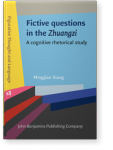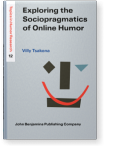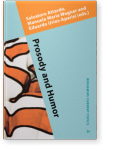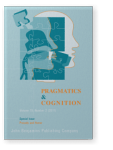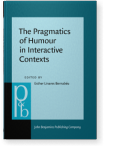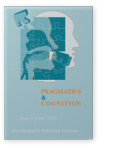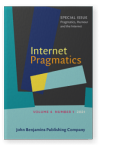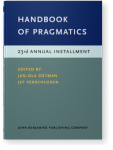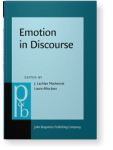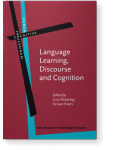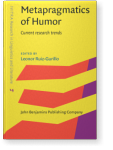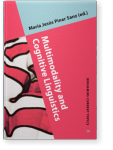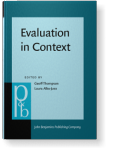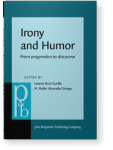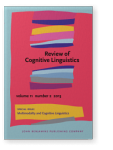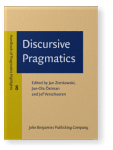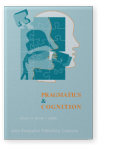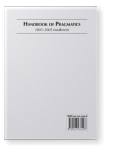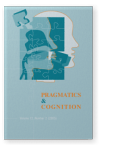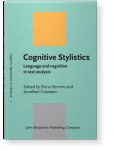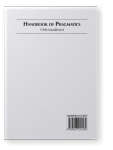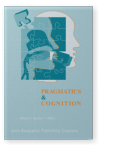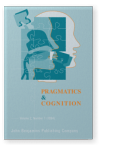Salvatore Attardo
List of John Benjamins publications for which Salvatore Attardo plays a role.
Book series
Titles
Prosody and Humor
Edited by Salvatore Attardo, Manuela Maria Wagner and Eduardo Urios-Aparisi
[Benjamins Current Topics, 55] 2013. v, 192 pp.
Subjects Discourse studies | Humor studies | Phonology | Pragmatics
Prosody and Humor
Edited by Salvatore Attardo, Manuela Maria Wagner and Eduardo Urios-Aparisi
Special issue of Pragmatics & Cognition 19:2 (2011) vi, 194 pp.
Subjects Cognition and language | Cognitive psychology | Discourse studies | Philosophy | Pragmatics
2023 From mode adoption to saluting a dead kitten: Reactions to a humorous tweet by Ricky Gervais The Pragmatics of Humour in Interactive Contexts, Linares Bernabéu, Esther (ed.), pp. 65–86 | Chapter
There has been some research in what can be broadly described as humor performance in the reactions to humorous turns (be they punch lines or jab lines). Two areas that have received particular attention are (1) the reactions to irony, which have been shown to range from mode adoption (i.e.,… read more
2022 “Dr. Shelby, that’s a world record!”: Frame breaking in experimental settings Pragmatics & Cognition 29:1, pp. 135–159 | Article
Participation in experimental studies can be conceptualized as Goffmanian frames, i.e. a set of rules which include the fact the experimenter will be observing participant behavior through (the recording of) the experiment. This study is focused on frame breaches in 16 video- and audio-recorded… read more
2021 On the order of processing of humorous tweets with visual and verbal elements Pragmatics, Humour and the Internet, Yus, Francisco (ed.), pp. 150–175 | Article
In this paper we examine the order of processing of multimodal tweets (text + image). Using an eye tracker, we collected a sample of 36 participants reading 25 humorous tweets. Our conclusions show that the processing of multimodal humorous tweets is in line with the processing of other… read more
2020 Humor Handbook of Pragmatics: 23rd Annual Installment, Östman, Jan-Ola and Jef Verschueren (eds.), pp. 155–181 | Chapter
2019 Chapter 8. Humor and mirth: Emotions, embodied cognition, and sustained humor Emotion in Discourse, Mackenzie, J. Lachlan and Laura Alba-Juez (eds.), pp. 189–212 | Chapter
The chapter describes a virtuous circle (feedback loop) whereby sustained humor (i.e., humorous exchanges lasting more than three turns) may occur, despite the tendency of speakers to return to the unmarked, serious mode of communication. Since humor is often accompanied by cues of humorous… read more
2018 Afterword. The theoretical and applied foundations of Andrea Tyler’s approach to the study of language Language Learning, Discourse and Cognition: Studies in the tradition of Andrea Tyler, Pickering, Lucy and Vyvyan Evans (eds.), pp. 301–310 | Chapter
2016 Smiling, gaze, and humor in conversation: A pilot study Metapragmatics of Humor: Current research trends, Ruiz-Gurillo, Leonor (ed.), pp. 235–254 | Article
This paper presents a pilot study, which is part of a larger research project intended to shed light on the role of smiling as a marker of humor in naturalistic conversation. Building on previous research (Attardo, Pickering, and Baker 2011; Calvo, Fernández-Martín, and Nummenmaa 2013; Calvo,… read more
2015 Multimodality in Conversational Humor Multimodality and Cognitive Linguistics, Pinar Sanz, María Jesús (ed.), pp. 181–194 | Article
The paper presents the analysis of the humor found in four dyadic conversations. The results of the conversational data match those of previous studies (Pickering et al., 2009): no differences were found in volume or speech-rate between humorous pause units and non-humorous ones. Similarly, pauses… read more
2014 The evaluative palette of verbal irony Evaluation in Context, Thompson, Geoff † and Laura Alba-Juez (eds.), pp. 93–116 | Article
In this chapter we present the results of both a theoretical and empirical study on the evaluative character of verbal irony. Our main research concern was to provide evidence as to whether all cases of verbal irony are ‘critical’ in nature or not, both by means of theoretical reflection and by… read more
2013 Intentionality and irony Irony and Humor: From pragmatics to discourse, Ruiz-Gurillo, Leonor and M. Belén Alvarado Ortega (eds.), pp. 39–58 | Article
The paper makes two central claims: the first is that irony a prototypical and perhaps exemplar category, there are some types of irony that are more “central” than others. The second claim is that irony is processed and produced largely subconsciously and that its meaning is indeterminate.… read more
2013 Prosodic and multimodal markers of humor in conversation Prosody and Humor, Attardo, Salvatore, Manuela Maria Wagner and Eduardo Urios-Aparisi (eds.), pp. 37–60 | Article
This case study extends the findings of Pickering et al. 2009 to the domain of conversational humor. We find that, as was the case in humorous narratives, conversational humor is not marked by higher pitch or volume, increased speech rate, or significant pauses. Unlike narrative humor,… read more
2013 Multimodality in Conversational Humor Multimodality and Cognitive Linguistics, Pinar Sanz, María Jesús (ed.), pp. 402–416 | Article
The paper presents the analysis of the humor found in four dyadic conversations. The results of the conversational data match those of previous studies (Pickering et al., 2009): no differences were found in volume or speech-rate between humorous pause units and non-humorous ones. Similarly, pauses… read more
2013 Introduction: Prosody and humor Prosody and Humor, Attardo, Salvatore, Manuela Maria Wagner and Eduardo Urios-Aparisi (eds.), pp. 1–13 | Article
2011 Humor Discursive Pragmatics, Zienkowski, Jan, Jan-Ola Östman and Jef Verschueren (eds.), pp. 135–155 | Article
2011 Review of Chafe (2007): The Importance of not Being Earnest. The Feeling Behind Laughter and Humor Prosody and Humor, Attardo, Salvatore, Manuela Maria Wagner and Eduardo Urios-Aparisi (eds.), pp. 375–382 | Review
2011 Prosodic and multimodal markers of humor in conversation Prosody and Humor, Attardo, Salvatore, Manuela Maria Wagner and Eduardo Urios-Aparisi (eds.), pp. 224–247 | Article
This case study extends the findings of Pickering et al. 2009 to the domain of conversational humor. We find that, as was the case in humorous narratives, conversational humor is not marked by higher pitch or volume, increased speech rate, or significant pauses. Unlike narrative humor,… read more
2011 Prosody and humor Prosody and Humor, Attardo, Salvatore, Manuela Maria Wagner and Eduardo Urios-Aparisi (eds.), pp. 189–201 | Article
2006 Review of Ritchie (2004): The Linguistic Analysis of Jokes Pragmatics & Cognition 14:3, pp. 585–589 | Review
2005 Humor Handbook of Pragmatics: 2003–2005 Installment, Östman, Jan-Ola and Jef Verschueren (eds.), pp. 1–25 | Article
2005 Klaus-Uwe Panther and Linda L. Thornburg (eds), Metonymy and Pragmatic Inferencing Pragmatics & Cognition 13:2, pp. 433–438 | Article
2002 Cognitive stylistics of humorous texts Cognitive Stylistics: Language and cognition in text analysis, Semino, Elena and Jonathan Culpeper (eds.), pp. 231–250 | Chapter
1997 Humor Handbook of Pragmatics: 1996 Installment, Verschueren, Jef, Jan-Ola Östman, Jan Blommaert † and Chris Bulcaen (eds.), pp. 1–18 | Article
1997 Competition and cooperation: Beyond Gricean pragmatics Pragmatics & Cognition 5:1, pp. 21–50 | Article
An argument is presented for augmenting Gricean pragmatics with cognitively significant information about whether the participants in the interaction share the same goals, the same amount of information, and the degree of their awareness of both. The additions handle situations of competitive… read more
1994 Non-literalness and non-bona-fîde in language: An approach to formal and computational treatments of humor Pragmatics & Cognition 2:1, pp. 31–69 | Article
The paper is devoted to the study of humor as an important pragmatic phenomenon bearing on cognition, and, more specifically, as a cooperative mode of non-bona-fide communication. Several computational models of humor are presented in increasing order of complexity and shown to reveal important… read more
